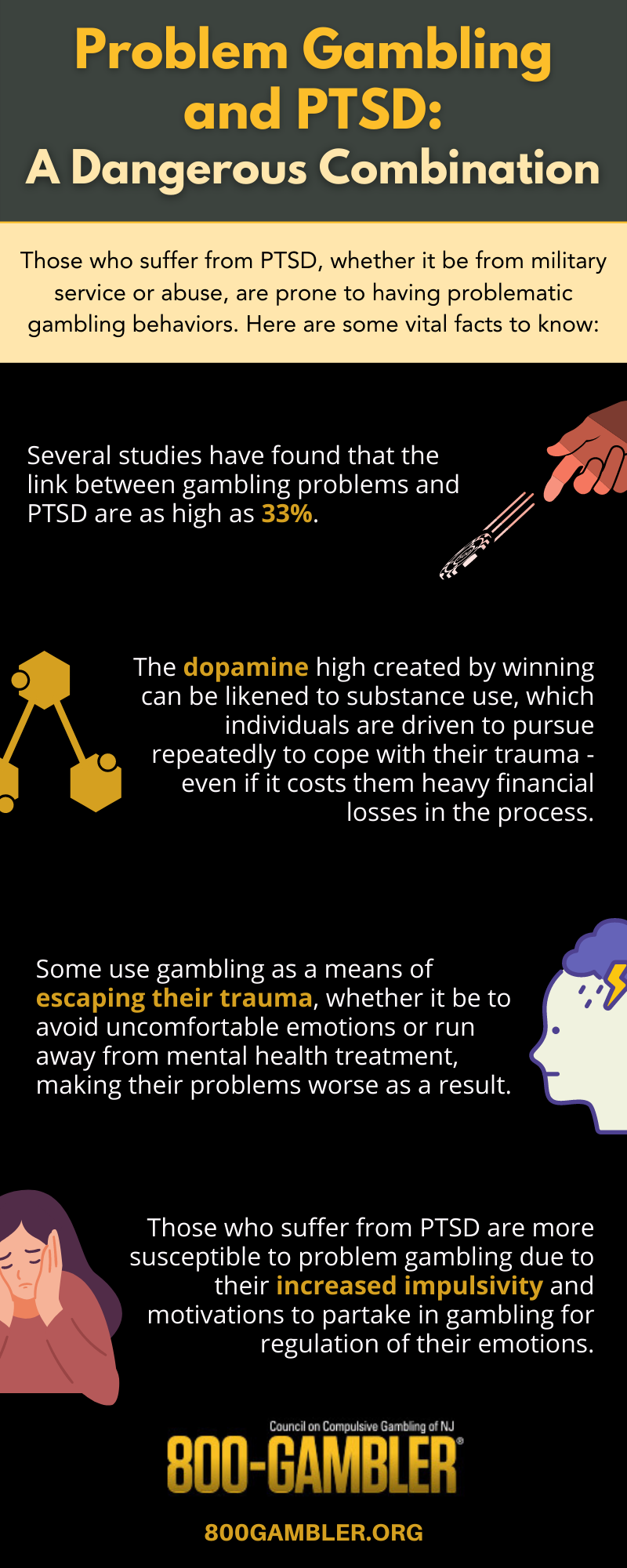Two significant problems that can overlap with one another are PTSD and problematic gambling behaviors. Veterans may develop post traumatic stress disorder due to traumatic incidents; however, anyone who endures trauma, such as abuse, can develop PTSD as well. While PTSD symptoms can cause numerous mental health problems, they can also develop problem gambling habits. These habits may lead to other issues, such as financial losses, missing work, and many other problems that, when compounded with PTSD, may lead to significant psychological harm. Here is a look at the connections between PTSD and problem gambling.

Percentages Pertaining to Gambling and PTSD
Many studies over the years have found a percentage link between those in the general population with PTSD and problem gambling. Several accounts have discovered a percentage link as high as around 33%, while the lowest percentage is 12%. Additionally, a study found that roughly 76% of compulsive gamblers also have a major depressive disorder, suggesting a correlation between adverse mental health and gambling issues.
Further, an analysis of veterans, who are at risk of problem gambling due to the PTSD they developed during their service, revealed that there were certain games they had a higher chance of partaking in.
- Instant scratch-off tickets were the most common at 31%.
- Traditional lottery consisted of 25%.
- Card games accounted for around 10%.
Gambling Can Be Used as an Unhealthy Coping Mechanism
One notable connection between PTSD and problem gambling is that those who suffer from trauma tend to use gambling as a coping mechanism. When they receive a reward associated with winning, their brain releases a rush of dopamine that triggers a state similar to being high. The positive emotion created by this effect can help those who have a mental disorder feel happiness when it would otherwise be difficult. However, this feeling does not last long and prompts individuals to desire more, resulting in their problem gambling predicament.
Using Gambling as a Temporary Escape
A primary reason why those who exhibit PTSD symptoms develop gambling problems is that they perceive it as a temporary escape from their problems. Because the sensation of gambling produces a similar effect in the brain to certain substances, it can create a ‘sigh of relief’ in the gambler’s mind. This feeling is also potentially seen as a way to soothe individuals who are processing uncomfortable emotions, allowing them to avoid dealing with them should they arise.
Furthermore, some individuals suffering from trauma, such as veterans, may use gambling as a means to avoid treatment for their mental health struggles. As a result, gambling has been used as a medium to run away from multiple problems, whether they be PTSD symptoms or addressing their issues directly.
PTSD Increases Susceptibility to Gambling Issues
Perhaps the most significant correlation between PTSD and problem gambling is that those who suffer from trauma are more susceptible to problematic gambling behaviors. Individuals who have PTSD are more likely to experience anxiety, depression, and substance misuse, which are other potential causes of gambling problems. Additionally, PTSD may cause some to exhibit impulsivity, which can drive them to purchase ticket after ticket in hopes of winning the lottery.
Research into PTSD and problem gambling has shown that problem gamblers with PTSD issues feel more motivated to partake in gambling for emotion regulation than those without PTSD. Further, because PTSD is associated with particular gambling motivations, such individuals are more susceptible to gambling triggers.
If you wish to learn about why veterans are more likely to develop gambling disorders, contact 800-GAMBLER today for more information.



